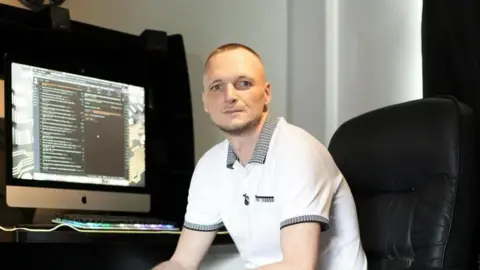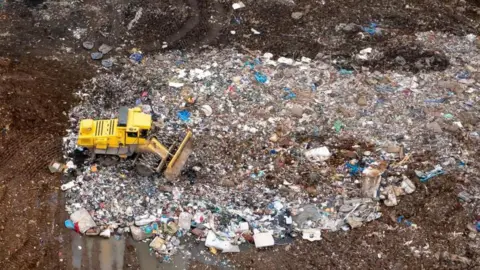James Howells gives up on retrieving hard drive from Newport landfill site
BBC News
 BBC
BBCIt has lasted 12 years, involving a High Court and Court of Appeal hearing, and a very public row between a computer engineer and a council – but could the Newport tip Bitcoin saga finally be coming to an end?
James Howells, from Newport, who claimed his ex-girlfriend mistakenly threw away a hard drive containing 8,000 bitcoins in 2013, has given up on retrieving the wallet, worth £620m, but has been hit with a £117,000 legal bill from his fight.
Instead of buying the site to retrieve it, he has now launched his own cryptocurrency – Ceiniog Coin – to try and regain some of his money.
Earlier this year, Newport council said it plans to close the site in the 2025-26 financial year, prompting Mr Howells to offer to buy it to retrieve the wallet.
But the authority said he owes them just under £117,000 after his attempts to buy the landfill went to court.
“We will not be spending any more of our officers’ time on this issue until that payment is made,” the council told BBC News.
It was a move Mr Howells described as “financial coercion”, to which the council refused to respond.
Mr Howells has spent significant time and energy trying to access the site and recover the cryptocurrency, once describing it as his “9 to 5”.
But in January, Newport council asked a High Court judge to strike out Mr Howells’ legal action to access the landfill or get £495m in compensation.
Judge Keyser KC said there were no “reasonable grounds” for bringing the claim and “no realistic prospect” of succeeding at a full trial.
This led Mr Howells to represent himself at the Court of Appeal in London, using artificial intelligence to support his case, but this was rejected.
 Getty Images
Getty ImagesEarlier this year, the council announced that the landfill site is set to close, after which Mr Howells said he intended to buy it.
“In July, I made a multi-million pound offer to Newport City Council. I followed up with the council’s legal team and the leader of the council,” Mr Howells said.
He said he did not receive a reply or an acknowledgement from the council regarding his offer.
A spokesperson for the council said that Mr Howells “currently owes the council just short of £117,000 in legal costs, costs which we occurred defending his claim for £500m submitted last year”.
It added that the council has a duty to the taxpayer to recover this money and to ensure that council resources are “used efficiently, and that officers time is not taken up unnecessarily”.
“As such, the council has responded to Mr Howells’ correspondence, reiterating that he is required to pay us these costs, and that we will not be spending any more of our officers’ time on this issue until that payment is made,” it added.
The council said it had not received any payment from Mr Howells and would not be commenting further.
Responding to the council’s comments, Mr Howells said it was “effectively holding the landfill sale process in an attempt to force a payment”, something he described as “financial coercion”.
“If they don’t wish to sell the site, they should say so clearly. But this tactic of using unrelated debts to shut down a lawful offer – one that’s in the public interest – raises serious questions, not just legally but morally,” he added.
Speaking to BBC News on Thursday, he said he remained “open to a proper discussion” with council leaders until 17:00 BST on Friday, “after which I no longer care what they do, and will move forward with a tokenisation proposal regardless”.
The council said it would not be commenting further.
What is Bitcoin?
Bitcoin is a cryptocurrency, a virtual or digital currency that has no physical form.
Bitcoins can be split into smaller units, with a satoshi being the smallest monetary unit.
Satoshis are named after bitcoin’s inventor Satoshi Nakamoto – believed to be a pseudonym – who wrote a key document about the currency in 2008.
Those investing in the product around this time, like Mr Howells, were part of a “very small” crypto community known as Cypherpunks, said Billy Bambrough, author of the CryptoCodex newsletter.
Bitcoin was not the first cryptocurrency to be invented, but it did gain considerable attention with early adherents being “very quickly enamoured with it”, Mr Bambrough said.
Prices began to rise in about 2016 and 2017, and again in 2020 during the Covid pandemic when “stock markets, cryptocurrencies and meme coins went up hugely”.
But Mr Howells is not giving up on utilising on his Bitcoin fortune.
He now intends to “tokenise” the full value of the wallet assets into a new Bitcoin-based smart token called Ceiniog Coin (INI), which he intends to launch later this year.
Mr Howells will use his Bitcoin wallet value as a “store-of-value or ‘vault'” providing backing for the new token.
Josh Riddict, a cryptocurrency expert, said there are many coins in crypto ecosystems that have “value derived from some kind of asset backing or vault”.
“Since James’ wallet is publicly known and the blockchain is there for all to see, its easy evidence that these 8,000 coins do indeed exist. The need to readily access them to ‘prove’ their existence simply isn’t required.
“Ultimately the market will decide how valuable they deem this new coin offering to be,” he added.
